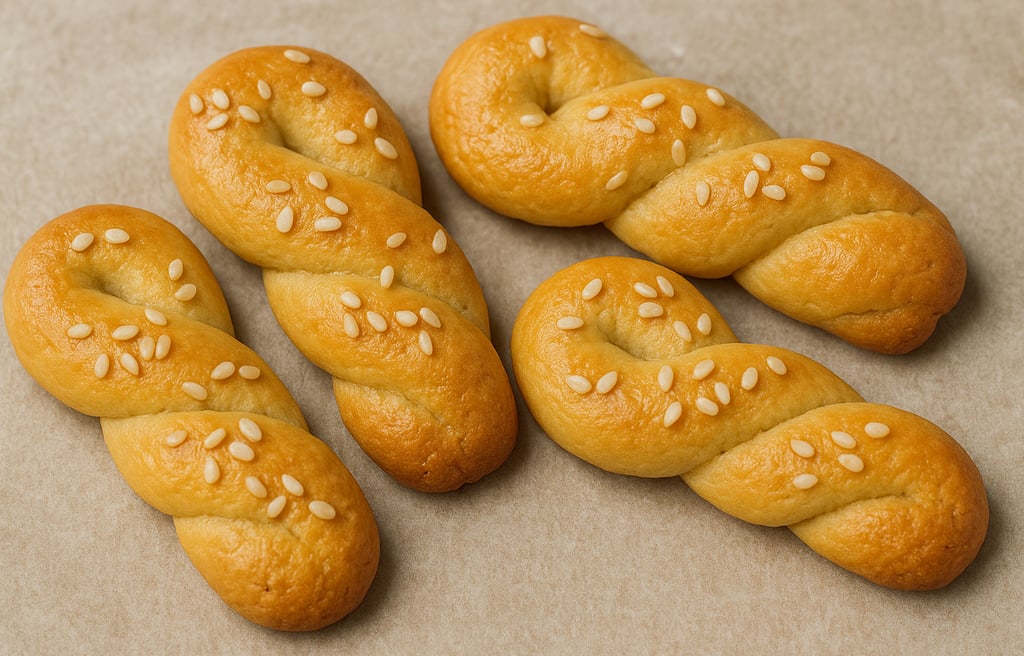Koulourakia - Greek Easter Cookies
These sacred Greek Easter cookies, passed down through generations, embody the warmth and hospitality I witnessed in Greek homes. Their delicate orange essence and perfect texture make them irresistible.
KITCHEN FLAVORS
Wandering Armenian
10/1/20252 min read


Koulourakia - Greek Easter Cookies
Cuisine: Greek Orthodox Easter Tradition
History and Cultural Significance
Koulourakia (pronounced "koo-loo-ra-kee-ah") hold deep roots in Greek Orthodox tradition, dating back centuries to Byzantine times. These sacred cookies emerged as symbols of resurrection and renewal, traditionally prepared during the solemn period leading to Easter Sunday. In ancient Greece, the circular and twisted shapes represented the eternal cycle of life, death, and rebirth - central themes of Easter celebration.
During the Ottoman Empire, Greek families preserved these recipes as acts of cultural resistance, passing them secretly through generations. The orange zest symbolized the sweetness of Christ's victory over death, while sesame seeds represented abundance and blessing. Today, koulourakia remain essential to Greek Easter tables worldwide, connecting diaspora communities to their ancestral homeland through taste and tradition.
Ingredients
6 cups all-purpose flour, sifted
4 tablespoons baking powder
3 cups vegetable oil (or mild-flavoured oil)
1¾ cups granulated sugar
6 large eggs
¼ cup sesame seeds (optional)
Zest of 1 large orange (traditional flavouring)
1 teaspoon vanilla extract (optional)
Preparation Process
Step 1: Create the Base
In a stand mixer bowl, combine oil and sugar. Beat at medium speed for 2-3 minutes until well blended. Add eggs one at a time, beating at medium speed for 5 minutes until mixture is light and fluffy.
Step 2: Form the Dough
Sift 5¾ cups flour with baking powder. Gradually add dry ingredients to wet mixture, mixing until just combined. Add remaining flour as needed until dough pulls away from bowl edges. The dough should be slightly sticky but formable into a ball.
Step 3: Rest and Shape
Allow dough to rest 20-30 minutes at room temperature for easier handling. Preheat oven to 375°F (190°C). Divide dough into 28–30-gram portions. Roll each piece into 5-inch ropes, then shape into traditional "S" curves or twisted rings.
Step 4: Bake to Perfection
Place shaped cookies on parchment-lined baking sheets. Optional: roll in sesame seeds before baking. Bake for 15 minutes, rotate pan, then continue baking 3-4 minutes until golden brown on top and bottom.
Step 5: Cool and Store
Cool on baking sheet for 2 minutes before transferring to wire racks. Store in airtight containers for 1-2 weeks at room temperature or freeze for longer storage.
Nutritional Content (Per Cookie)
Calories: 185
Carbohydrates: 22g
Fat: 9g
Protein: 3g
Fiber: 1g
Sugar: 8g
Sodium: 95mg
Based on 36 cookies per batch
Pro Variation Tips
Flavor Variations
Ouzo Koulourakia: Replace 2 tablespoons oil with ouzo for authentic Greek flavor
Lemon Twist: Substitute orange zest with lemon zest and add 1 tablespoon fresh lemon juice
Olive Oil Version: Use extra virgin olive oil for richer, more traditional taste
Spiced Cookies: Add ½ teaspoon ground mastic or mahlab for authentic Greek bakery flavor
Shaping Techniques
Traditional Braids: Create three-strand braids for special occasions
Ring Shapes: Form circles for children - easier to handle and eat
Letters: Shape into Greek letters for personalized gifts
Egg Wash Glaze: Brush with beaten egg before baking for glossy finish.
Storage and Serving
Dunk in Greek coffee or hot chocolate for authentic experience
Serve alongside Greek yogurt and honey for dessert
Package in cellophane bags as Easter gifts
Freeze shaped, unbaked cookies for fresh-baked convenience
Concluding Thoughts
Like the communities I served as an aid worker, these cookies remind us of those simple ingredients, when blessed with love and tradition, nourish both body and soul. As Ecclesiastes 3:1 teaches, "To everything there is a season" - may these Easter treasures bring joy to your table and peace to your home.
Recipe adapted from traditional Greek family methods, refined through years of baking and sharing across cultures.

